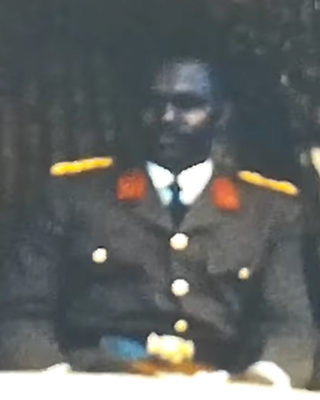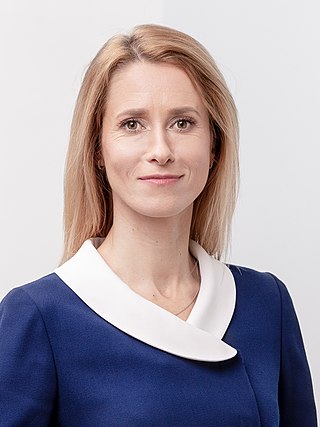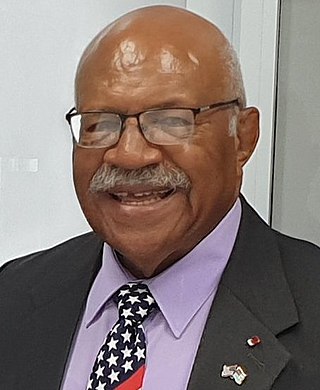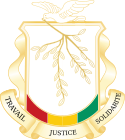
The politics of Equatorial Guinea take place in a framework of a presidential republic, whereby the President is both the head of state and head of government. Executive power is exercised by the government. Legislative power is vested in both the government and the Chamber of People's Representatives

The politics of Guinea-Bissau take place in a framework of a semi-presidential representative democratic republic, with a multi-party system, wherein the President is head of state and the Prime Minister is head of government. Executive power is exercised by the government. Legislative power is vested in both the government and the National People's Assembly.

Michel Micombero was a Burundian politician and army officer who ruled the country as de facto military dictator for the decade between 1966 and 1976. He was the last Prime Minister of the Kingdom of Burundi from July to November 1966, and the first President of the Republic from November 1966 until his overthrow in 1976.

Lansana Conté was a Guinean politician and military official who served as the second president of Guinea, from 3 April 1984 until his death on 22 December 2008. Conté came to power in the 1984 Guinean coup d'état.

The prime minister of Estonia is the head of government of the Republic of Estonia. The prime minister is nominated by the president after appropriate consultations with the parliamentary factions and confirmed by the parliament (Riigikogu). In case of disagreement, the parliament can reject the president's nomination and choose their own candidate. In practice, since the prime minister must maintain the confidence of parliament in order to remain in office, they are usually the leader of the senior partner in the governing coalition. The current prime minister is Kaja Kallas of the Reform Party. She took the office on 26 January 2021 following the resignation of Jüri Ratas.

The Minister for Foreign Affairs is a cabinet minister responsible for foreign relations and diplomacy of Fiji, and oversees its Ministry of Foreign Affairs and International Cooperation. Especially since two military coups in 1987 harmed Fiji's relationship with other countries, with two more coups in 2000 and 2006 respectively, the Foreign Minister's position has been a very important one.

The Rally of Democratic Forces, or Assembly of Democratic Forces, is a political party in Mauritania. It is led by Ahmed Ould Daddah.

The unicameral Assemblée nationale or National Assembly is Guinea's legislative body. Since the country's birth in 1958, it has experienced political turmoil, and elections have been called at irregular intervals, and only since 1995 have they been more than approval of a one-party state's slate of candidates. The number of seats has also fluctuated.
Ahmed Tidiane Souaré is a Guinean political figure who was the Prime Minister of Guinea from May 2008 to December 2008, when he was replaced by Kabine Komara following a military coup d'état.

The 2008 Guinean coup d'état occurred in Guinea on 23 December 2008, shortly after the death of long-time President Lansana Conté. A junta called the National Council for Democracy and Development, headed by Captain Moussa Dadis Camara, seized power and announced that it planned to rule the country for two years prior to a new presidential election. Camara did indeed step down after Alpha Condé was elected in the 2010 election.
The 1996 Nigerien coup d'état was a military coup d'état which occurred on 27 January 1996 in Niamey, Niger. It ousted Niger's first democratically elected president, Mahamane Ousmane after nearly three years in power and installed General Ibrahim Baré Maïnassara as head of state. Prime Minister Hama Amadou was arrested in the coup and several soldiers and presidential guards were killed in the fighting.
This page is based on this
Wikipedia article Text is available under the
CC BY-SA 4.0 license; additional terms may apply.
Images, videos and audio are available under their respective licenses.




























